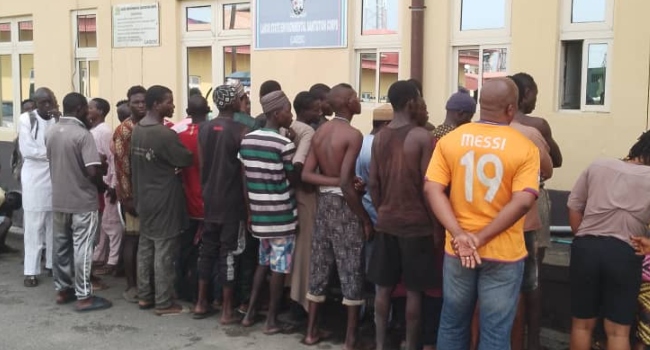
WafricNews – June 11, 2025
Lagos, Nigeria - A Lagos Magistrate Court sitting in Bolade Oshodi has ordered the remand of 34 individuals, including two women, for allegedly engaging in illegal street trading and criminal activity along the congested median strip of the Alaba Rago area in Ojo, off the ever-busy Lagos-Badagry Expressway.
Lagos, Nigeria - A Lagos Magistrate Court sitting in Bolade Oshodi has ordered the remand of 34 individuals, including two women, for allegedly engaging in illegal street trading and criminal activity along the congested median strip of the Alaba Rago area in Ojo, off the ever-busy Lagos-Badagry Expressway.
The suspects, arraigned on Tuesday, were swept up in a weekend clampdown led by the Kick Against Indiscipline (KAI) task force in collaboration with Lagos Waste Management Authority (LAWMA). Authorities say the operation targeted makeshift stalls, illegal structures, and suspected dens of petty crime that have overrun the major transit corridor.
Magistrates ordered the defendants into prison custody until July 22, 2025, pending further proceedings.
Trading or Trespass?
While street trading has long been a survival strategy for Lagos’ informal economy, the government insists that the occupation of the road median — meant for vehicular separation — poses serious safety and environmental risks.
According to law enforcement officials, the median at Alaba Rago had become a hotspot not only for unregulated commerce but also for criminal hideouts, with some suspects allegedly sleeping in shanties and using the cover of trading to perpetrate crimes.
Commissioner Sounds a Warning
Reacting to the court decision, Tokunbo Wahab, Lagos State Commissioner for the Environment and Water Resources, said the state government would no longer tolerate what he called “deviant behaviour” that undermines public order.
“We will not allow Lagos to descend into lawlessness under the pretext of hustle,” Wahab stated. “The administration remains committed to enforcing environmental laws and restoring sanity to our public spaces.”
He urged residents to uphold basic standards of civility and contribute to the creation of a cleaner and more sustainable urban environment.
A Symptom of Bigger Problems
Critics, however, argue that enforcement alone won't resolve the deeper issues driving street trading in Lagos — namely, poverty, joblessness, and lack of access to regulated markets.
“When the state focuses only on repression without providing alternatives, it becomes a war on the poor,” one rights advocate told WafricNews under condition of anonymity.
With the July hearing date now set, the city’s long-running tension between urban planning and informal survival economies remains as fraught as ever — and the Lagos-Badagry Expressway, once envisioned as a symbol of West African connectivity, remains a contested front line in that struggle.
By WafricNews Desk.


Comment
To post a comment, you have to login first
LoginNo Comments Yet...